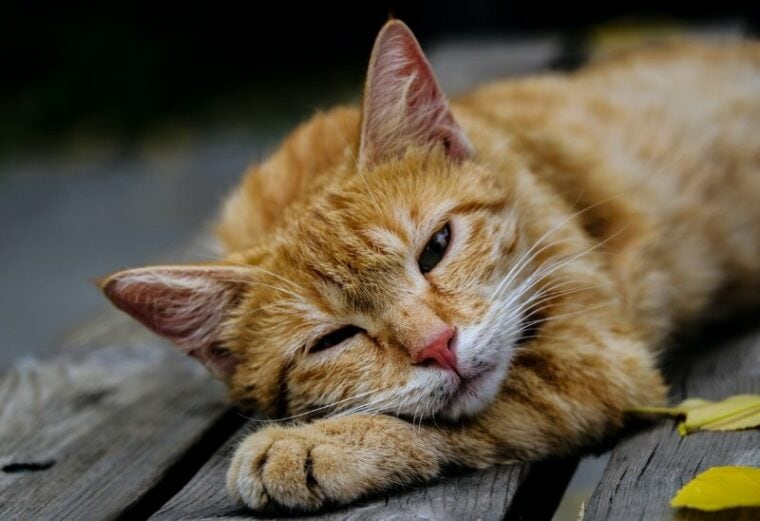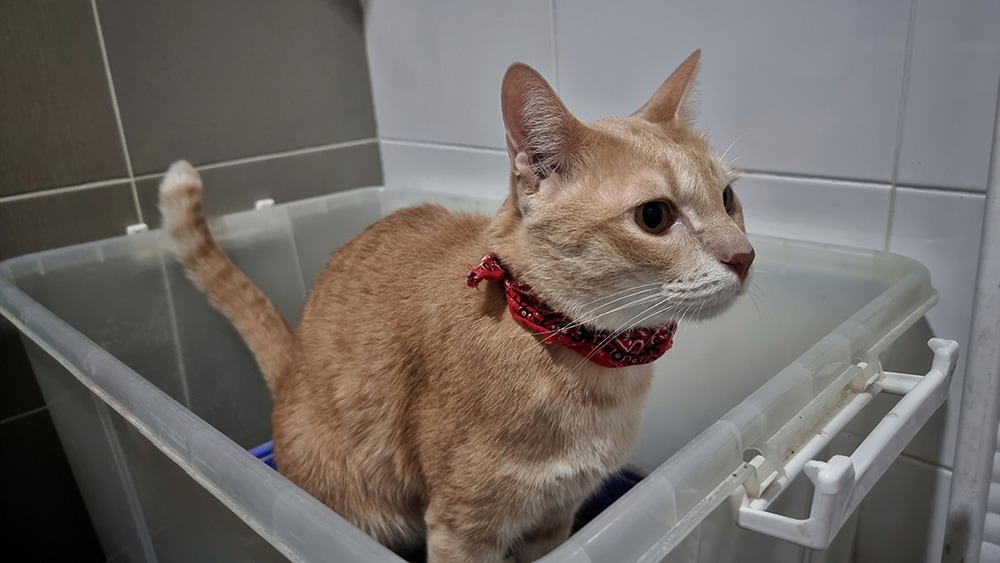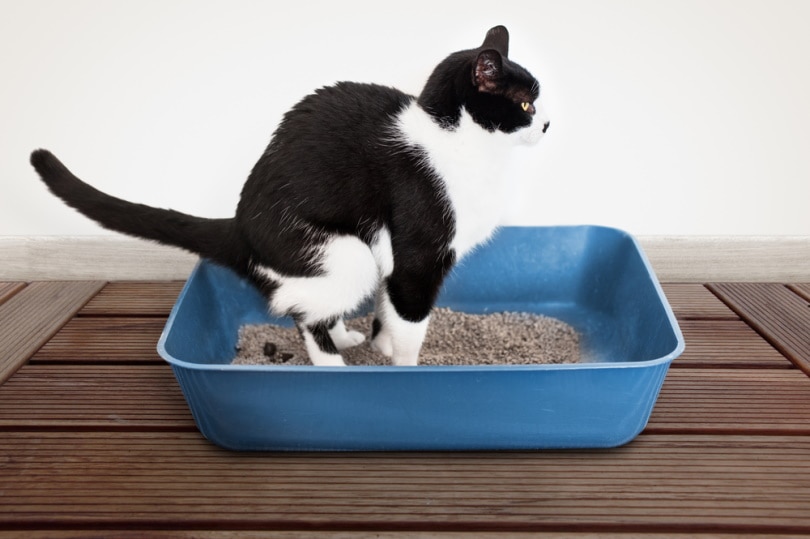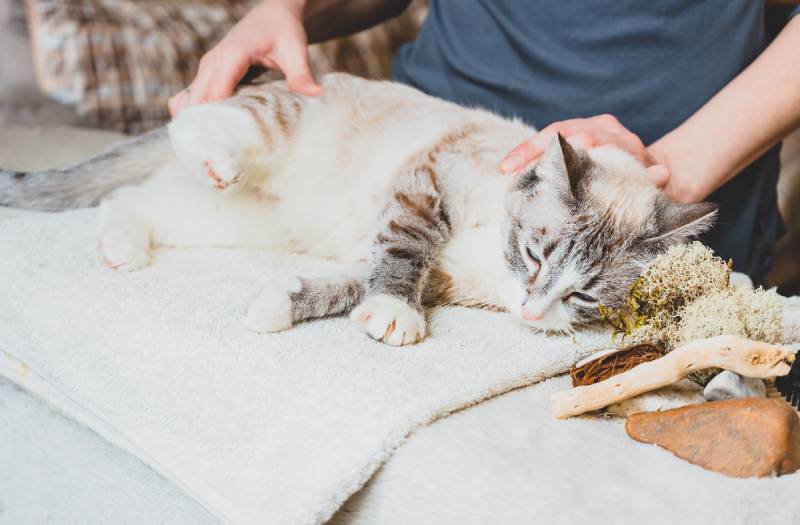
In this article, we will discuss the disease giardia. We will learn all the vocabulary words we need to describe the parasite that causes it. And we will learn how giardia becomes a problem as it degrades the digestive tract.
Cats and other animals, including humans, get giardia easily. It is very contagious. And it is fairly common, especially in outdoor cats or cats with unreliable access to clean food, water, and toilet areas.
Read on to assess how much of a risk giardia is to your cat.
What Is Giardia?
Giardia is a gastrointestinal infection caused by a single-celled parasite. It causes weight loss and diarrhea. It is common in cats and in most species in general, including people.
The disease is called giardia—as is the parasite. So, when someone is infected with giardia, they are said to have the disease. Giardia, the parasite, lives in the intestines of cats (and other animals) and disrupts the digestion and absorption of food and nutrients. As a result, it causes diarrhea and weight loss.

What Are the Signs of Giardia?
The most famous sign of giardia is diarrhea. However, not every cat with giardia will have diarrhea. So, this can mean you might not even know your cat has giardia.
If your cat is losing weight but still eating normally, bring them to the vet. In cats, this is a clinical sign of multiple diseases, including giardia, and it needs to be dealt with. Be aware of these signs:
What Is Malabsorption?
The biggest problem with giardia is that it causes malabsorption, which is when the body fails to absorb the nutrients it needs from the food eaten.
Giardia causes the walls of the intestine to degrade, which means the intestinal wall cannot absorb nutrients as well as it should. As the structure of the wall is degraded, it cannot function properly, so water, electrolytes, vitamins, minerals, fats, carbs, and proteins are not absorbed.
This malabsorption creates feces that is abnormal, which is diarrhea. And it means the body begins to lose weight. Giardia diarrhea can have a variety of looks and ranges in intensity.
Animals that do not have apparently obvious signs of giardia can still be a source of infection for other animals. They can pass it on to others who are more susceptible and fragile.
What Are the Causes of Giardia?
Giardia is a gastrointestinal infection caused by a protozoon. Protozoa are single-celled organisms. Giardia have thin, tail-like structures they use to swim. This anatomical structure gives them the name flagellated protozoans. They depend on their host’s GI tract to survive—to eat, grow, and reproduce—just like other parasites, such as worms. As a result, giardia are flagellated protozoan parasites. All the vocab words today
The protozoa giardia produces reproductive cells called cysts. Cysts are more resistant and can survive outside the intestine better than individual protozoa. The cysts are passed through the feces, and cats pick up the cysts when they come into direct contact with infected feces or the environment where the feces used to be.
Cysts can survive in the environment, especially if protected from extreme heat, cold, and dryness, for weeks, even months. As a result, they can build up in the environment easily. The cysts prefer to be damp, so keeping everything nice and dry is best.

How Do I Care for a Cat With Giardia?
Stopping exposure to giardia is the best way to start treating giardia. In general, giardia is killed with bleach, or hot, boiling, water. They also do not survive as long in dry environments—as opposed to damp cool places. Keep this in mind as you used the suggested decontamination techniques below.
If your cat goes outside, they may be more likely to get giardia out there. And if your cat is diagnosed, then your yard might have a particularly high level of contamination. While it is a good idea to remove any feces, if you can find it, the reality is it is not possible to decontaminate it.
If giardia needs veterinary treatment, medications are prescribed.
Frequently Asked Questions (FAQs)
Can I get giardia from my cat?
Both humans and cats can get giardia, and dogs for that matter. Other animals include the following:
However, it is not always clear if the same species of giardia in cats will also infect humans. There are many species of giardia, and each one has unique host requirements (the species it infects).
Getting giardia from your cat is not very common, but it is also not impossible. Some giardia species can infect multiple species, and others are single-species dependent. So, the best thing to do is to assume you can get giardia from your cat and be careful if your cat is diagnosed. Be extra vigilant in cleaning their litter boxes. Wash your hands…the usual.
And tell your doctor if both you and your cat have diarrhea. Giardia is common in humans, anyway.

How is it diagnosed?
With a fecal exam, your vet will examine the feces under the microscope, looking for cysts. They may perform what is called a fecal float. Where feces mixes with special salt water, which makes the cysts float to the top, concentrating them and pulling them out of the rest of the feces. Making it easier to find them.
However, cysts do not pass in the feces all the time; they are excreted intermittently. This means that one week there might be cysts in the feces but not the next week, but the protozoa have been in the intestine the whole time. So, it may take repeated fecal tests to diagnose it.
Your vet may also be able to use molecular techniques to diagnose giardia in the feces.
Conclusion
Giardia is a long-term gastrointestinal single-celled parasite that causes diarrhea and weight loss. It can be frustrating to treat but can also hide undiagnosed in cats causing few clinical signs of disease.
A healthy adult cat eating a well-balanced diet with all the nutrients they need will be able to fight off a giardia infection better than a cat on a poor diet. Or a cat that does not have clean food and water or a nice dry place to defecate.
A last caution
Well, that is almost everything you need to know about giardia. Remember, it is easy to end up in an internet spiral diagnosing your precious cat with all the scary diseases, especially diseases with vague and unreliable clinical signs. But the good thing about vague and mild clinical signs is that they also usually mean your cat is not suffering.
So, if your cat is not aggressively losing weight or has uncontrolled diarrhea. And as long as you are protecting yourself. This is not the time to panic. Be proactive and fix it but don’t panic.
Featured Image Credit: estoymhrb, Pexels






